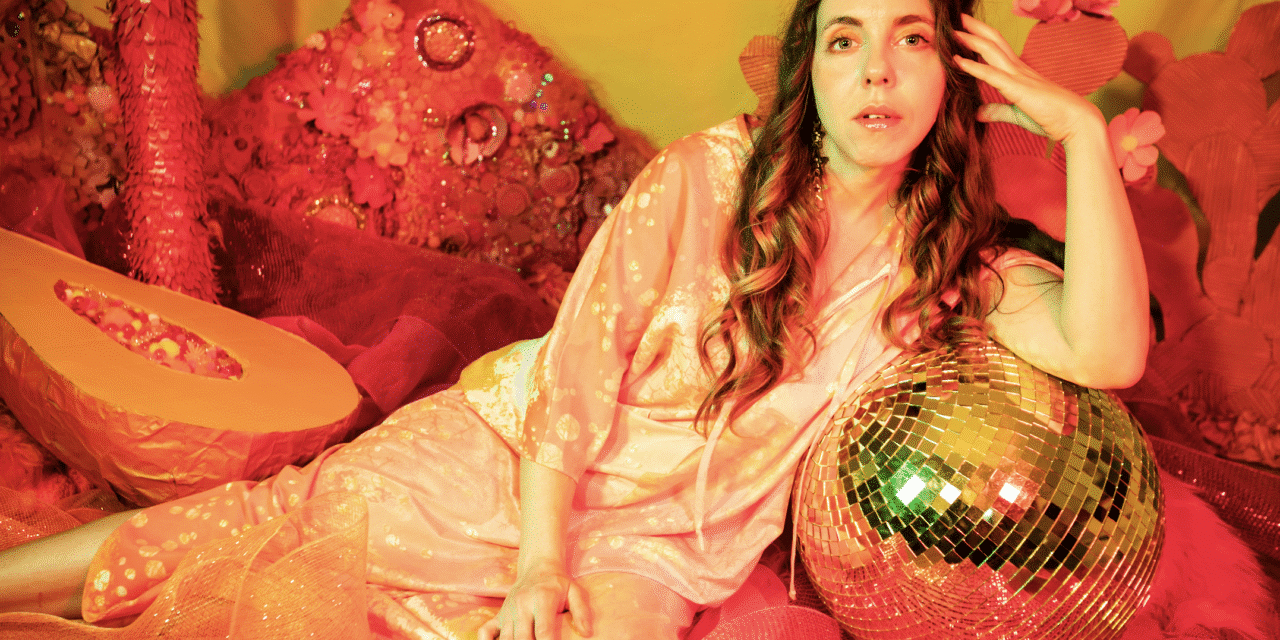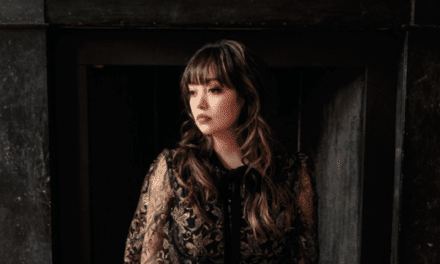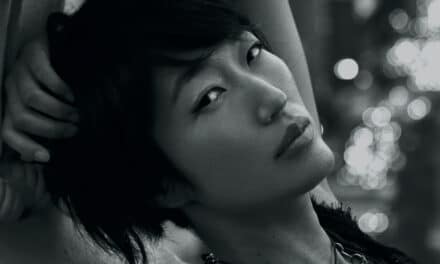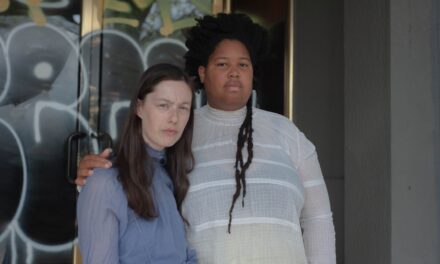Photo credit: Ellie Alonzo
On Lost in the Desert, Claire Morales isn’t just singing — she’s confronting. The Denton, TX-based singer, songwriter, and visual artist has always had a knack for creating work that feels bigger than just a collection of songs. But with her upcoming album — out August 19 and available for pre-order now — Morales levels up, delivering a cinematic, unflinching odyssey through self-doubt, rage, desire, and resolve.
We get our first glimpse of that journey on Champion, the album’s lead single, which dropped this week alongside a one-take video that feels as raw and immediate as the song itself. Premiered via Glide Magazine, the track is streaming everywhere now — and it’s a searing, soul-baring declaration of a woman learning to stop running from herself.
“‘Champion’ was written during a time when my life was exploding,” Morales admits. “I had spent years avoiding conflict — hello, avoidant tendencies — and unsurprisingly, that created major issues in my personal life.”
The song is a jagged love letter to discomfort, a propulsive anthem for anyone who’s ever swallowed their words one too many times. And while the subject matter may feel heavy — that quiet implosion of suppressed anger and fear — Champion manages to channel it all into something propulsive, loud, and cathartic. Morales leans into the irony of avoidance, calling it “a fight about fighting,” and the video mirrors that same uneasy intimacy. In a single unbroken shot, Morales grapples with the camera itself, screaming, crying, and ultimately releasing what she calls “all the emotions that are too scary to express in real time.”
It’s a fitting first chapter for Lost in the Desert, a record that promises to be as mercurial as it is self-assured. Morales and her band — with guitarist Alex Hastings co-producing and engineering — recorded much of it live in Denton, TX, capturing a rawness that matches the deeply personal stories behind the songs. With contributions from a community of local friends and legends, the record becomes not just a solo reckoning, but a communal one — proof of how power can blossom when you’re brave enough to speak your truth.
And while Champion roars with rock-and-roll grit, the full album promises tonal shifts that are just as dramatic as Morales’ own emotional journey: bright bursts of pop here, folky hushes there, ominous psychedelic swells throughout. Every song seems to inhabit a different corner of the desert she’s traversing — part dreamscape, part battleground.
More than anything, Lost in the Desert is a call to persevere: to keep existing, to keep questioning, even when the world seems designed to crush you. “It is as much a demonstration of feminine power,” Morales says, “as it is a signpost for the lost and disheartened to press ahead, even and especially when the journey feels insurmountable.”
That power is written all over Champion. It’s angry. It’s tender. It’s self-aware and a little bit funny. It dares you to stop hiding and feel it all — even when it hurts.
In Claire Morales’ desert, survival isn’t just possible. It’s beautiful.
Lost in the Desert is out August 19. Stream Champion now and pre-order the album here.
Pre order the album HERE
“Champion” feels like an emotional exorcism in one take. What was scarier—facing the camera or facing yourself?
Oof I would say facing myself, always! Behind the camera and throughout the set were three of my longtime friends and creative soulmates. We love eachother and believe in one another deeply, so it was easy to face them and create a space in which an honest performance could happen. But facing myself can be a much trickier practice. It’s the quiet work of honesty and self reflection and kindness towards self and actually listening to that quiet, higher self voice of knowing. Scary but worthwhile work in my mind.
You describe the song as “a fight about fighting.” Do you think conflict is something we ever get good at—or just better at surviving?
I think it’s something we can get better at with time. What I’ve been trying to do as of late is to reframe how I contextualize conflict itself. When I was younger, I always thought of disagreement as an inherently bad, dangerous thing, but as I get older the people pleasing tendencies are falling away. Now I view disagreement as something that is bound to happen sometimes if we are all being honest. And the real ones want to know when they have hurt you and will share with you when you’ve hurt them. And maybe criticism when it’s delivered with kindness and regard is just useful feedback, if we allow it to be. I think we just have to look past our own egos and try to do what’s right.
Avoidance has a way of looking peaceful until it explodes. How did it feel to write an album in the rubble of your own patterns?
It was very humbling, very vulnerable, and very difficult. The album before this one All that Wanting is about desire destroying your life, and once I released the record, I could feel it coming to life. There was no containing it once unleashed. A fellow performer once told me that the lyrics you write are your mantras. You repeat them every night, and there is significance and power in their recitation. I started experiencing this effect in real time on the first tour I took with my band. The themes I was singing about became real, and I let desire be the catalyst for a lot of honesty and destruction frankly. And so Lost in the Desert came out of the ruin, and it was this way of reckoning with what I had done and who I truly am when I’m not avoiding or trying to keep the peace. The ugly parts, the human parts came out. I let the guilt and shame of it all break me for a long time. But eventually, I found a way to share the feeling and give it somewhere to go. And I wrote it with the intent of healing and also, hopefully, making others feel less alone and helping them heal too. And it made me realize that sometimes we have to walk through the dark places in order to gain wisdom and strength and self-knowledge, and that discomfort is just part of the trade off for growth.
Lost in the Desert moves between genres like someone stumbling through shifting terrain—was that sonic instability intentional, or just what healing actually sounds like?
It was intentional and it was responsive. I tend to let the themes I’m writing about dictate the energy of a song. I don’t believe in sticking to a genre dogmatically just for the sake of sameness. The story that I was telling demanded big shifts and a myriad of tones, so I let it move through me and be what it was. I just tried to capture it rather than molding it. And in the end, I really love a dynamic album where no two songs sound the same. Nothing bores me more than a record full of songs that are indistinguishable from one another.
You’ve created a whole visual world around this album, including a graphic novella. When words fail, what does drawing give you access to emotionally that songwriting doesn’t?
Drawing is maybe my first love, so there’s this creative ease in it for me. It’s a language I’m a lot more fluid in, and I think it can be a bit more intuitive for people in general than music, so it almost has this universal quality. I drew a lot of the graphic novella as we were recording, so it was great to be able to show my band the drawings and be like “this is where we are, this is what it looks like, this is the world we are building”. It was honestly this visual example that helped tether me and keep me on track. I may not know what effect needs to go on a guitar, but I can see the curves and colors of the terrain. I also sculpted the Joshua Tree and the set on the album cover during a time of heartbreak, which was a very useful exercise. I highly recommend making a tree as a way of recovering from a breakup.
There’s something mythic about the “solo female odyssey” in your album—were you inspired by any specific myths or legends while shaping this narrative? Or is this all personal mythmaking?
I’m a Greek mythology nerd, so I’m sure there is a good bit of that mythos in my work. I love a hero’s journey, but it’s always bothered me how these journeys always seem to star a man, on his own, against the elements rather than a woman. I wanted to depict feminine strength but also the journey towards self-actualization from a female perspective, the trials, the victories, the lures, the discoveries, the fall the way back towards the true path. Much of classic literature and art has this tendency to depict women as either purely good or wholly evil, and I’m interested in showing what’s in between. The ugly human parts. And beyond that, this album is about my own personal journey (with metaphors draped over everything to add artsy flare and a layer of comforting obscurity!) A lot of it is inspired by tours and performing music and the solo van trips I’ve been taking the last few years. Along the way I always run into women who tell me they wish they could travel alone. Part of the album was just wanting to depict that kind of journey and remind other women that doing it alone is possible and that women are fucking powerful. A demonstration of strength.
You talk about “speaking your truth”—but what do you do with the truths that are too jagged to say out loud?
Art has always felt like a place to put everything that has nowhere else to go. Anything I’m too afraid to say out loud I tend to sing. And if it’s truly too scary to even vocalize, it becomes a guitar line or a drawing. Taking away the need to verbalize is extremely cathartic and spiritual in a sense. For me, music is this very safe way to deal with the truths that feel a bit unsafe.
You recorded much of this live, which gives the album a kind of volatile heartbeat. Was there ever a take that scared you—because it felt too raw, too real?
Definitely yes, especially in terms of vocals. It’s funny you ask this because for Champion, we initially did the vocals in a sound booth after all the live takes of the instruments. I was pretty pleased with them and figured they were wrapped. But then Alex Hastings (our band’s guitarist and the engineer and producer on this record) asked me to come back days later and redo the lead. I was a bit peeved, like dude, we already got the take, why am I here? But he had this great idea of me using a Shure SM58, this mic that is most often used for live performance. And instead of being confined to a sound booth, he had me in this big room in the studio where I could move around and do my dance moves and stuff. It gave the vocals the feeling of being performed live, because in essence they were. And while perhaps less technically spot on, they felt real. It took me a minute to adjust to the idea and accept the rawness, but in the end it was the truest way to perform the song, which is all that ever matters.
The desert is such a rich metaphor—emptiness, temptation, clarity. For you, what lives out there in that psychic terrain?
Many creatures, many things. Witches, cult leaders, fruit eaters, astral projections, ghosts of the past, a neon labyrinth, self-knowledge, heartbreak, love, solitude, everything we’ve avoided, the answers we seek, the horror of chaos, everything uncontained and wild. I don’t think we can truly know until we’re there, and there’s no controlling what it will be.
If Lost in the Desert is a map for the disheartened, what’s the last thing you want someone to feel when they reach the final track?
I want them to remember that they are stronger for what they have lived through, that there is a path forwards but no path back. There is a price to be paid for learning some secrets of the universe, and the price is not being able to return to the world you once knew, because you are changed and the world along with you. And rather than trying to return to the places you’ve outgrown or being consumed by the shame over what’s happened, you just have to take the lessons you’ve learned and apply them as you keep moving forward.





